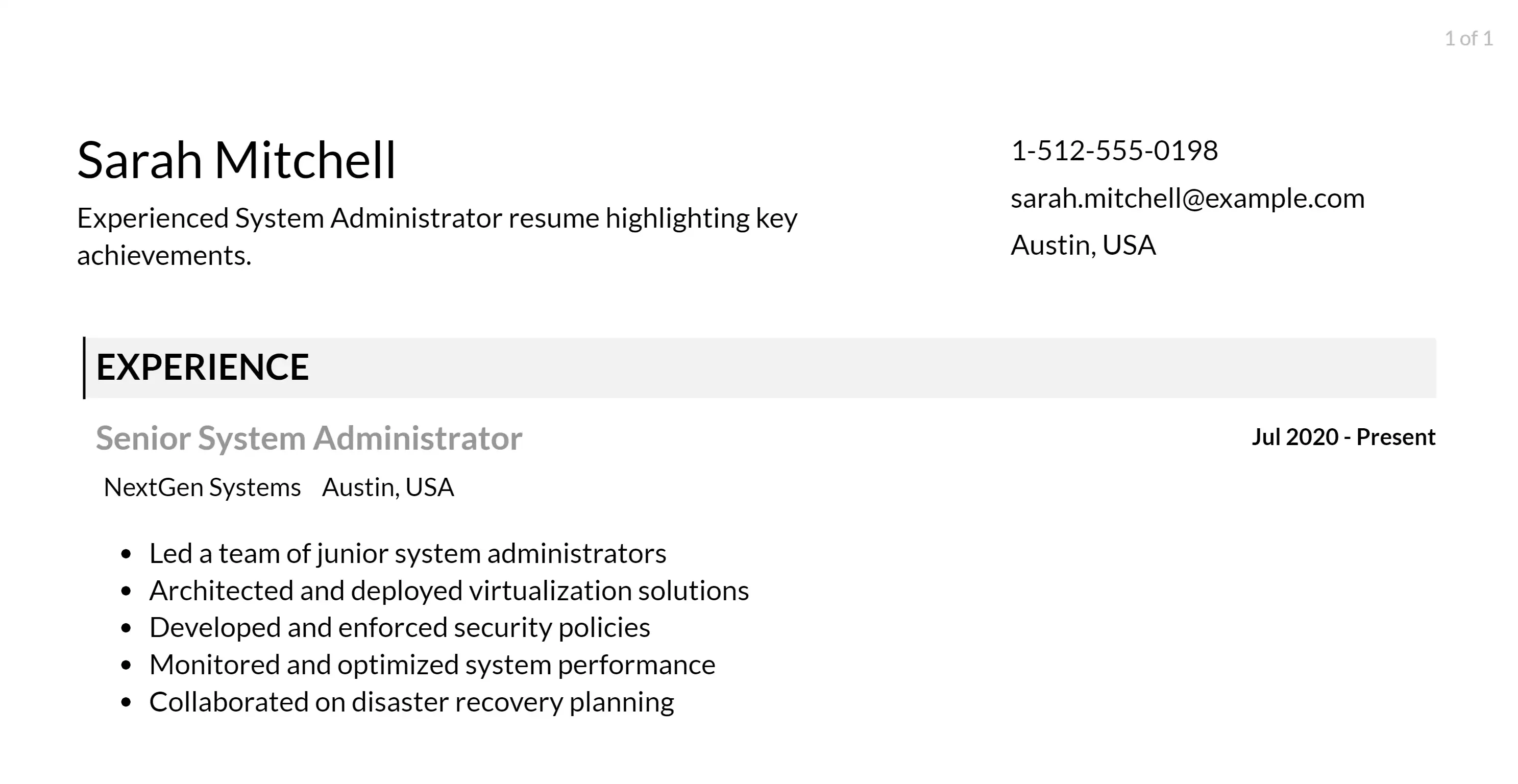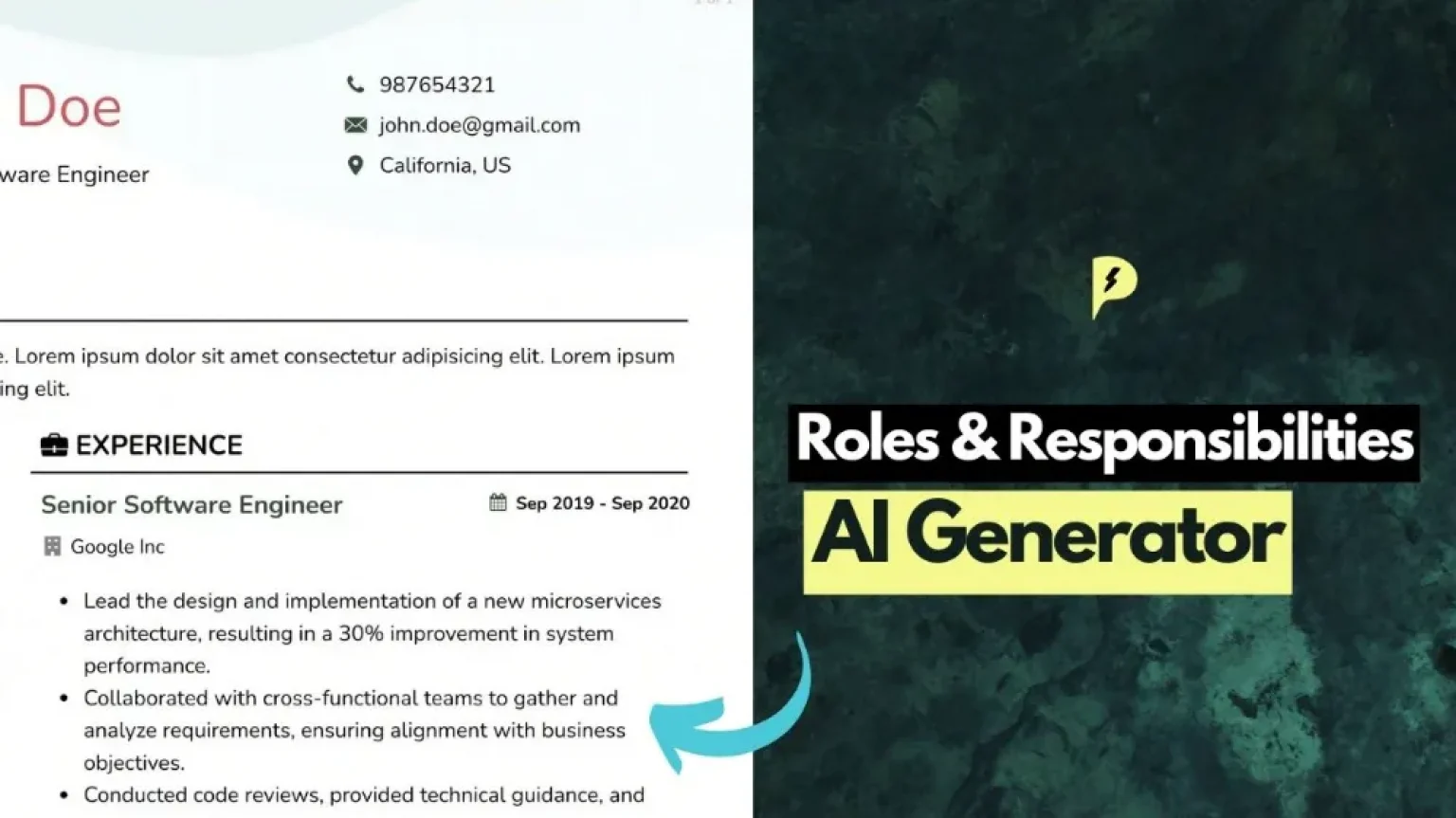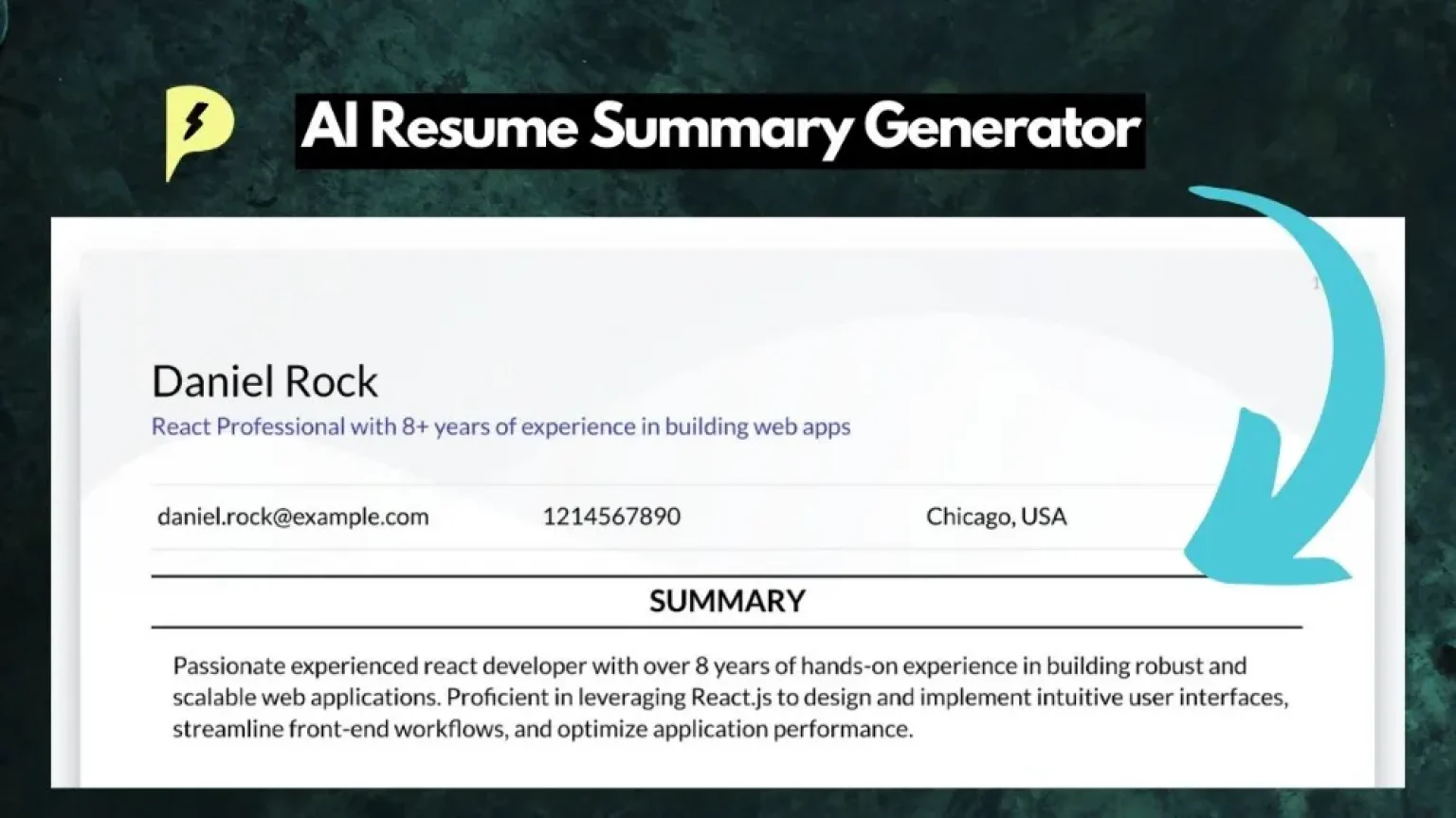System administrators play a vital role in maintaining the backbone of an organization’s IT infrastructure. They ensure that networks run smoothly and securely, and they troubleshoot issues that can disrupt daily operations. Adding well-defined roles and responsibilities to your resume not only highlights your experience but also demonstrates your suitability for the job. With placements.app, you can easily craft a professional resume that clearly outlines your responsibilities, making your skills stand out to potential employers.
Example #1: Fresher System Administrator roles & responsibilities
For freshers, it’s important to focus on showcasing your eagerness to learn, adaptability, and foundational technical skills. You may not have professional experience yet, but demonstrating hands-on lab work, internships, or self-taught skills in system administration can set you apart. Below list are some of the samples for system administrator resume duties for fresher job positions.- Assisted in setting up new hardware and software systems for small-scale deployments during college projects or internships.
- Monitored and maintained basic network configurations, including IP address management and DNS updates, during practical lab sessions.
- Troubleshot minor hardware or software issues using basic diagnostic tools, helping to maintain uninterrupted computer lab operations.
- Gained familiarity with user account creation, password management, and permissions settings in a controlled lab environment or through academic assignments.
- Learned to perform regular system updates and patches on virtual machines to ensure they were up to date with security protocols.
Example #2: Entry Level System Administrator roles & responsibilities
As an entry-level system administrator, your responsibilities will grow to include more hands-on tasks that directly affect daily operations. While you may not yet be the lead decision-maker, your role in maintaining and supporting systems is essential to the organization’s stability. Below list are some of the samples for system administrator resume duties for entry level job positions.- Managed daily system performance checks, identifying any issues with network connectivity or slow server response times.
- Assisted in setting up and configuring servers and workstations, ensuring that hardware and software installations were properly integrated and up to company standards.
- Provided technical support for end-users, resolving issues with hardware failures, software updates, or network connectivity problems within a short time frame.
- Monitored network traffic and security logs, reporting suspicious activity or potential security threats to senior administrators.
- Implemented routine data backups and recovery testing to ensure that critical information could be restored in the event of a system failure.
Example #3: Junior System Administrator roles & responsibilities
For junior system administrators, you’re expected to have a deeper understanding of system operations, security protocols, and troubleshooting processes. Your experience will involve maintaining critical systems and ensuring they perform optimally for end users. Below list are some of the samples for system administrator resume duties for junior job positions.- Collaborated with senior IT staff to develop system improvement strategies, contributing to long-term infrastructure planning.
- Conducted regular security audits, checking for system vulnerabilities and ensuring that firewalls, antivirus programs, and intrusion detection systems were up to date.
- Managed user permissions and roles within the network, ensuring that sensitive data was protected while users could access necessary resources.
- Maintained servers by performing software updates, patching, and hardware upgrades, ensuring minimal disruption during maintenance windows.
- Developed and maintained detailed documentation on system configurations, troubleshooting steps, and network diagrams for future reference.
Copy above entry level System Administrator roles and responsibilities and paste in resume builder
Tips, Do’s & Don’ts For Entry Level Candidates
Tips
- Highlight any experience with system administration tools, even if it’s from academic labs or personal projects.
- Mention any technical certifications or online courses that show your initiative in learning key skills, like networking or server management.
- Focus on problem-solving abilities, even if the problems you’ve solved were in a training environment.
- Demonstrate a willingness to collaborate with more experienced professionals and learn from them.
- Include any relevant side projects, like setting up a home server or troubleshooting friends’ computer networks, to show hands-on experience.
DO’s
- Showcase hands-on experience with network troubleshooting and server maintenance in your daily tasks.
- Include knowledge of scripting and automation to improve efficiency in handling routine tasks.
- Highlight any experience with monitoring systems to prevent downtime and optimize performance.
- Demonstrate your ability to provide technical support to end-users in a professional setting.
- Mention your familiarity with data backup procedures and disaster recovery plans.
DON’TS
- Don’t exaggerate your experience with complex systems—focus on what you’ve actually worked on.
- Avoid listing outdated technologies—mention relevant and modern tools in the field.
- Don’t neglect soft skills—teamwork and communication are critical, especially when explaining technical problems to non-technical users.
- Don’t skip out on emphasizing attention to detail, especially with documentation and troubleshooting.
- Avoid focusing solely on theoretical knowledge—employers want to see practical skills in action.
Example #4: Senior System Administrator roles & responsibilities
For senior system administrators, the focus shifts to overseeing large-scale IT infrastructure and leading a team of administrators. Your responsibilities will include managing complex systems, ensuring security protocols, and optimizing performance across the entire organization. Below list are some of the samples for system administrator resume duties for senior job positions.- Led a team of junior system administrators, providing mentorship and guidance in troubleshooting complex technical issues and implementing system upgrades.
- Architected and deployed virtualization solutions to improve system scalability and resource management, reducing hardware costs by 20%.
- Developed and enforced security policies, ensuring compliance with industry standards and significantly reducing vulnerabilities across the network.
- Monitored and optimized system performance, ensuring minimal downtime and improving response times for mission-critical applications.
- Collaborated with cross-functional teams to design and implement disaster recovery plans, successfully reducing data recovery time by 50%.
Example #5: Experienced System Administrator roles & responsibilities
Experienced system administrators need to emphasize their ability to manage a wide range of IT operations. Your resume should showcase your experience in maintaining uptime, troubleshooting advanced issues, and ensuring the security and reliability of all systems under your care. Below list are some of the samples for system administrator resume duties for experienced job positions.- Designed and implemented enterprise-level infrastructure projects, including cloud migration strategies, ensuring seamless integration with legacy systems.
- Performed deep-level diagnostics on critical system failures, using advanced monitoring tools and experience to rapidly restore functionality.
- Led a company-wide initiative to improve cybersecurity, significantly reducing the organization’s vulnerability score through new policies and practices.
- Collaborated with executive leadership to define IT strategy, aligning technical goals with business objectives to drive growth and efficiency.
- Provided expertise in scaling large networks, ensuring that systems could handle increased loads during peak periods with minimal performance degradation.
Example #6: Expert System Administrator roles & responsibilities
As an expert system administrator, your role involves strategic planning and the continuous improvement of IT systems. You’ll focus on designing cutting-edge solutions, troubleshooting at an advanced level, and providing high-level leadership to IT departments. Below list are some of the samples for system administrator resume duties for expert job positions.- Designed and implemented enterprise-level infrastructure projects, including cloud migration strategies, ensuring seamless integration with legacy systems.
- Performed deep-level diagnostics on critical system failures, using advanced monitoring tools and experience to rapidly restore functionality.
- Led a company-wide initiative to improve cybersecurity, significantly reducing the organization’s vulnerability score through new policies and practices.
- Collaborated with executive leadership to define IT strategy, aligning technical goals with business objectives to drive growth and efficiency.
- Provided expertise in scaling large networks, ensuring that systems could handle increased loads during peak periods with minimal performance degradation.
Copy above experienced System Administrator roles and responsibilities and paste in resume builder
Tips, Do’s & Don’ts For Experienced Candidates
Tips
- Emphasize any leadership experience, such as mentoring junior team members or leading projects.
- Include quantifiable achievements, like system uptime percentages or cost reductions due to system optimizations.
- Showcase advanced technical skills, such as scripting, automation, and virtualization, that demonstrate your ability to streamline operations.
- Highlight any experience with high-availability systems or disaster recovery planning, which are crucial for large-scale environments.
- Mention your involvement in security, including implementing protocols or responding to incidents.
DO’s
- Demonstrate experience with large-scale systems and multi-site environments, showcasing your ability to manage complex infrastructures.
- Highlight your ability to work with cross-functional teams, especially in disaster recovery planning and system integration projects.
- Showcase leadership experience, such as managing IT teams or leading major system upgrades and migrations.
- Focus on your expertise in automation and scripting to reduce system downtime and improve efficiency.
- Emphasize any certifications or continuous learning initiatives that demonstrate staying updated with current technologies.
DON’TS
- Don’t downplay the importance of soft skills like leadership, communication, and project management in senior roles.
- Avoid listing outdated technologies or irrelevant tools—focus on modern solutions like cloud infrastructure and virtualization.
- Don’t neglect to mention security—omitting cybersecurity skills could be a red flag in today’s environment.
- Avoid vague responsibilities; be specific about your role in system improvements, network security, or major infrastructure projects.
- Don’t exaggerate leadership roles if you haven’t directly led teams or projects—stay truthful and focused on your actual contributions.
Conclusion
In the competitive landscape of IT, clearly articulating your roles and responsibilities as a system administrator is essential. Whether you’re a fresher eager to enter the field or an experienced professional looking to advance your career, a well-structured resume can make all the difference. With placements.app’s user-friendly resume builder, you can seamlessly showcase your qualifications, ensuring you capture the attention of hiring managers.



